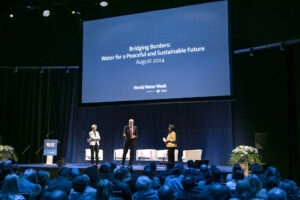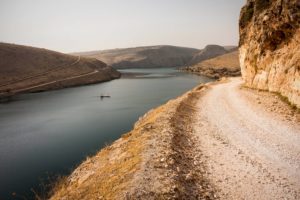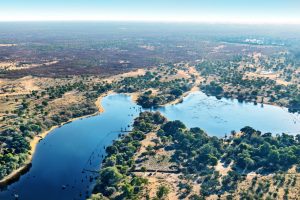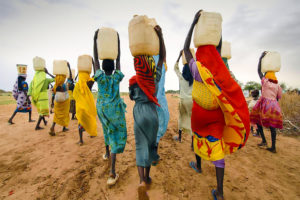- SIWI – Leading expert in water governance
- /
- Latest
- /
- Innovations leading the way to water and peace
Innovations leading the way to water and peace
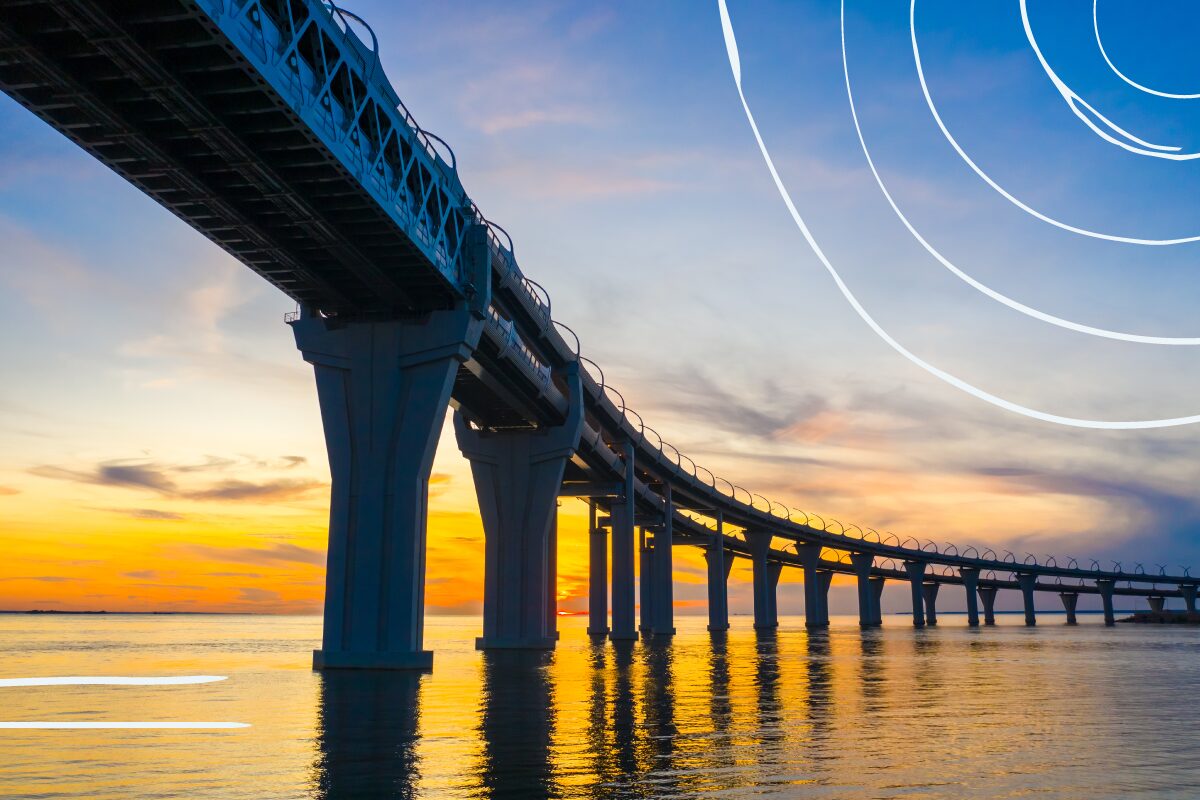
As an entry point into cooperative dialogues, water can be a platform on which to base peaceful knowledge sharing discussions, capacity building, and long-term climate-resilient solutions to many of the world’s conflicts and tensions. To get there, innovative thinking, technologies and solutions must continue to lead the way. If new routes to peace are charted, water can begin the journey.
New tools for peace through water
In many parts of the world, water is being used as a base for diplomacy and cooperation, alongside new technologies, working toward peace. Particularly in areas of conflict and tensions, these innovations can pave the way for sustainable peace that goes beyond conflicts, and instead maintains long-term resilience.
Reclaiming water
One of the best ways to innovatively utilize water is to reuse it. When wastewater is treated and reclaimed, reducing bacteria, and making water safe to consume or reuse for farming, this process gives regions and nations increased resilience in the face of uncertain climate trends. By leveraging the latest technologies, water can be reclaimed for safe use.
- In Saudi Arabia, water is at the forefront of the latest project in NEOM. Their sustainable water goal is to recycle 100% of wastewater, with a net zero footprint.
- In Tunisia, a water-scarce country, water is an even more vital resource that must be carefully distributed. In 2021 through the Northern Tunis Wastewater Project, wastewater was treated and reclaimed for land use, irrigation, and farming, helping the country become resilient to the water scarcity they face as a result of climate change. The World Bank has helped similar projects get off the ground in Brazil, Ecuador, and Bolivia – ensuring wastewater is properly treated and reclaimed.
- In Australia, the Western Corridor Recycled Water Project was completed in 2008, with the set up of a connecting water grid of dams, reservoirs, and other storage systems to treat and reuse water, feeding it to power stations and industries, alongside agriculture use as well as drinking water.
- In the European Union (EU), in 2023, the Water Reuse Regulation was set by the EU Commission to ensure treated wastewater is reused. Although around 90% of wastewater is collected and treated across the European Union (EU) according to the European Environment Agency (EEA), six times more water could be reused than what is currently recycled.
Cooperative technologies, financing, and partnerships
When different countries, sectors, and actors cooperate over water – the benefits far outweigh just the water sector.
- Between the United States and Canada, the Columbia River Treaty unites these two countries in regards to maintaining the river and the generation of power from the river basin. Each side shares information, both coordinate plans for the river, and maintain the power system together.
- The World Bank works to bring funding and knowledge to low-income countries. They often sign agreements with countries to provide support for water-related projects to ensure equal access to water, sanitation and hygiene, among others. For example, in 2015, the World Bank signed an agreement with Israel to help bring their water technology to developing countries.
- Blue Peace is a funding collaboration that allows transboundary and multi-sectoral water cooperative financing. Investments are made through “negotiated political agreements among completely diverse interests” that allow better sharing of common water resources.
- The Shared Water Partnership Programme, supported by Sweden, the Netherlands, USA, and UNDP, helps countries to cooperate over shared water resources by developing frameworks, knowledge sharing, and capacity development. The programme focuses on information sharing for better collaboration.
Country preparedness tools
There are various innovative tools being implemented that increase a country’s preparedness for conflicts, especially over water.
- The Water and Peace Security Partnership (WPS) is a collaboration between the Netherlands Ministry of Foreign Affairs and six international research institutes and non-governmental organizations (NGOs) that has recently produced the Global Early Warning Tool – an artificial intelligence data analysis tool that forecasts short and long term conflicts. This tool takes into account local contexts and predicts possible opportunities for intervention before conflict begins. If used more regularly, the tool could help reduce water related conflicts on a large scale, incorporating global actors and sectors.
- The International Centre for Water Cooperation (ICWC) has assessed more than 30 water basins in Africa for preparedness, offering policy insights and areas for cooperation within contextualized and localized arenas. The ICWC continues to analyse and assess other regions, particularly conflict-laden areas, for innovative and cooperative solutions to water related issues.
- The Wilson Center and the National Oceanic and Atmospheric Administration (NOAA) have come together to build the Improving Predictive Capabilities project for climate security risks, which better enables “evidence-based frameworks to address weather, climate, and water stressors in tandem”. This tool can help prevent climate related disasters from overwhelming regions by predicting a conflict before it begins.
- The Environmental Performance Index is a tool that focuses on how well countries mitigate environmental threats using data analysis for more than 180 countries. The Nordic countries continue to maintain most of the top spots for water resources, as well as mitigating water threats, along with Singapore and the Netherlands in 2022.
World Water Week 2024
In August of 2024, SIWI will once again host the World Water Week in Stockholm. This year’s conference will focus on interconnectivity as a means to build sustainable peace, under the theme Bridging Borders: Water for a Peaceful and Sustainable Future.
Experts, practitioners, and government representatives will share knowledge, and work together to implement the latest water discoveries, solutions, and impacts. This conference will shed light on the latest innovative technologies being used, as well as bridge gaps in connecting funding opportunities and capacities to build a more sustainable way forward. The Stockholm Water Prize is awarded each year at the conference for extraordinary water achievements, and the Stockholm Junior Water Prize is awarded for water research projects.
Most recent

SIWI’s endorsement of the COP29 Declaration on Water for Climate Action
- Water and climate
- World Water Week
- Water governance

SIWI-WASH experts join IVL
- Water, Sanitation and Hygiene (WASH)
- Water governance

Women hold the key to building climate resilience
- Gender and water
- Resilience through water
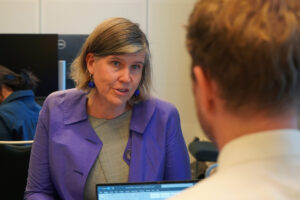
Bridging Borders: A Conversation with Meike van Ginneken
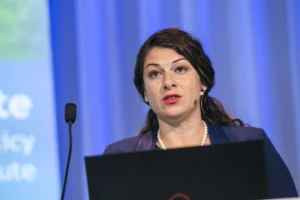
Why you should join this year’s high level panel at World Water Week
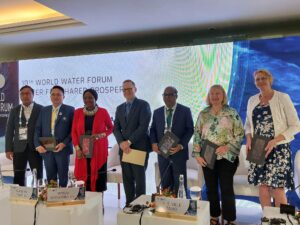
Bridging borders through source-to-sea management
